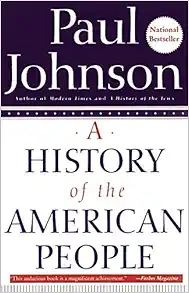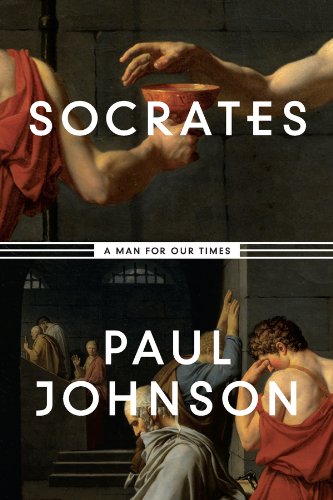
Description
"Paul Johnson's A History of the American People is as majestic in its scope as the country it celebrates. His theme is the men and women, prominent and unknown, whose energy, vision, courage and confidence shaped a great nation. It is a compelling antidote to those who regard the future with pessimism." — Henry A. Kissinger "A memorable, pleasurable, and instructive reading experience...This outstanding narrative interpretation, whether underscoring either the costs and injustices attending this country's creating or emphasizing admirable aspects of democratic, constitutional achievement." — Booklist "Johnson understands something most academics today do not know or want to admit, to wit, that the social and political history of the United States has been driven largely by a peculiar religiosity that in time made Americanism itself into a civic religion....His zesty, irreverent narratives teach more history to more people than all the post-modernist theorists, highbrow critics and dons put together." — Walter A. McDougall "A fresh, readable and provocative survey. . . . Johnson can be very wise." — Los Angeles Times "Masterly—readable, intelligent and, depending on your point of view, either annoyingly or endearingly cranky." — Newsweek "Arresting contentions and pieces of fascinating oddball information. . . . The book also offers a rare opportunity to witness someone trying to make sense of all 400 years of American history and to discover what 'tremendous lessons' it holds for Americans and 'the rest of mankind.'" — New York Times Book Review "His zesty, irreverent narratives teach more history to more people than all the post-modernist theorists, highbrow critics and dons put together." — Times Literary Supplement "This is vivid and memorable writing...Proves that history can still be literature." — National Review "The creation of the United States of America is the greatest of all human adventures," begins Paul Johnson's remarkable new American history. "No other national story holds such tremendous lessons, for the American people themselves and for the rest of mankind." Johnson's history is a reinterpretation of American history from the first settlements to the Clinton administration. It covers every aspect of U.S. history--politics; business and economics; art, literature and science; society and customs; complex traditions and religious beliefs. The story is told in terms of the men and women who shaped and led the nation and the ordinary people who collectively created its unique character. Wherever possible, letters, diaries, and recorded conversations are used to ensure a sense of actuality. "The book has new and often trenchant things to say about every aspect and period of America's past," says Johnson, "and I do not seek, as some historians do, to conceal my opinions." Johnson's history presents John Winthrop, Roger Williams, Anne Hutchinson, Cotton Mather, Franklin, Tom Paine, Washington, Adams, Jefferson, Hamilton, and Madison from a fresh perspective. It emphasizes the role of religion in American history and how early America was linked to England's history and culture and includes incisive portraits of Andrew Jackson, Chief Justice Marshall, Clay, Lincoln, and Jefferson Davis. Johnson shows how Grover Cleveland and Teddy Roosevelt ushered in the age of big business and industry and how Woodrow Wilson revolutionized the government's role. He offers new views of Harding, Coolidge, and Hoover and of Franklin Roosevelt's New Deal and his role as commander in chief during World War II. An examination of the unforeseen greatness of Harry Truman and reassessments of Eisenhower, Kennedy, Johnson, Nixon, Reagan, and Bush follow. "Compulsively readable," said Foreign Affairs of Johnson's unique narrative skills and sharp profiles of people. This is an in-depth portrait of a great people, from their fragile origins through their struggles for independence and nationhood, their heroic efforts and sacrifices to deal with the `organic sin' of slavery and the preservation of the Union to its explosive economic growth and emergence as a world power and its sole superpower. Johnson discusses such contemporary topics as the politics of racism, education, Vietnam, the power of the press, political correctness, the growth of litigation, and the rising influence of women. He sees Americans as a problem-solving people and the story of America as "essentially one of difficulties being overcome by intelligence and skill, by faith and strength of purpose, by courage and persistence...Looking back on its past, and forward to its future, the auguries are that it will not disappoint humanity." This challenging narrative and interpretation of American history by the author of many distinguished historical works is sometimes controversial and always provocative. Johnson's views of individuals, events, themes, and issues are original, critical, and admiring, for he is, above all, a strong believer in the history and the destiny of the American people. Paul Johnson is a historian whose work ranges over the millennia and the whole gamut of human activities. He regularly writes book reviews for several UK magazines and newspapers, such as the Literary Review and The Spectator , and he lectures around the world. He lives in London, England. Read more
Features & Highlights
- Paul Johnson's prize-winning classic,
- A History of the American People
- , is an in-depth portrait of the American people covering every aspect of U.S. history—from politics to the arts.
- "The creation of the United States of America is the greatest of all human adventures," begins Paul Johnson's remarkable work. "No other national story holds such tremendous lessons, for the American people themselves and for the rest of mankind."
- In
- A History of the American People
- , historian Johnson presents an in-depth portrait of American history from the first colonial settlements to the Clinton administration. This is the story of the men and women who shaped and led the nation and the ordinary people who collectively created its unique character. Littered with letters, diaries, and recorded conversations, it details the origins of their struggles for independence and nationhood, their heroic efforts and sacrifices to deal with the 'organic sin’ of slavery and the preservation of the Union to its explosive economic growth and emergence as a world power. Johnson discusses contemporary topics such as the politics of racism, education, the power of the press, political correctness, the growth of litigation, and the influence of women throughout history.
- Sometimes controversial and always provocative,
- A History of the American People
- is one author’s challenging and unique interpretation of American history. Johnson’s views of individuals, events, themes, and issues are original, critical, and in the end admiring, for he is, above all, a strong believer in the history and the destiny of the American people.



